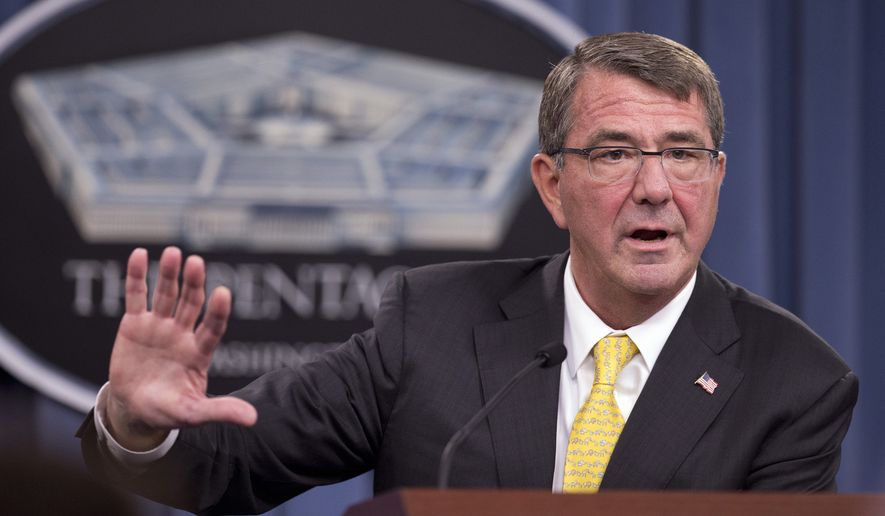Under pressure at home and abroad to wage a more robust war against the Islamic State, Obama administration officials said Thursday that the U.S. is prepared to expand its “rules of engagement” in the fight after the extremist group’s horrific attacks in Paris.
Top national security advisers to President Obama said the U.S.-led coalition is increasing airstrikes against fuel trucks and other “high value” targets of the terrorist organization in Syria and Iraq. Defense Secretary Ashton Carter said attacks on fuel conveys reflect “changed tactics.”
White House Deputy National Security Adviser Ben Rhodes said surveillance flights by coalition partners have provided the U.S. with intelligence to bomb oil infrastructure and cut off revenue for the Islamic State, also known by the acronyms ISIL and ISIS.
“The more we have cooperation from intelligence partners in the region and in Europe, the more effective we’re going to be,” Mr. Rhodes said. “We’ve increased the targeting of ISIL oil infrastructure in recent days with great success in targeting trucks that were carrying oil that brings significant amounts of revenue to ISIL.”
Mr. Carter said the U.S. is constantly reviewing its “rules of engagement” in the fight against the terrorist group.
“The thing that most enhances the impact of the air campaign is better and better intelligence,” he said on “Morning Joe” on MSNBC. “We took out ’Jihadi John,’ we took out the head of ISIL in Libya, we’re running raids like the one that got Abu Sayyaf.”
SEE ALSO: Obama says Syrian refugees are no bigger threat to U.S. than ‘tourists’
“Jihadi John” and Abu Sayyaf were top Islamic State commanders thought to have been killed in coalition operations in recent months in Syria.
Mr. Obama, attending an economic summit in the Philippines, spoke by phone Thursday with French President Francois Hollande about “the way forward to defeat ISIL,” the White House said.
“Both leaders reiterated their unwavering commitment to degrade and destroy ISIL,” a statement from the White House said. Mr. Obama will host Mr. Hollande at the White House on Tuesday.
Since the Paris attacks last week that killed at least 129 people and twin explosions in Beirut that killed 43, the administration has been criticized for waging an ineffective military campaign against the Islamic State. Hours before the Paris attacks, Mr. Obama said the extremist group had been “contained” in Syria and Iraq.
Democratic presidential front-runner Hillary Rodham Clinton, who served as Mr. Obama’s secretary of state, urged a more aggressive “new phase” in fighting the militants, saying an intensified air campaign should be combined with ground forces.
“Our goal is not to deter or contain ISIS, but to defeat and destroy ISIS,” Mrs. Clinton said Thursday in a speech to the Council on Foreign Relations.
Breaking with Mr. Obama, the top Democrat on the House Permanent Select Committee on Intelligence called for creating a “safe zone” inside Syria as part of an escalated campaign to thwart potential Islamic State attacks on the U.S.
“We see ISIS branching out in places around the world, and it is a growing menace,” Rep. Adam B. Schiff of California told Yahoo News in an interview broadcast on Sirius XM. “Until we successfully evaporate that sanctuary they have in Syria and Iraq, they will have the time and the space and the resources to plot against us. And even the best intelligence agencies — and we have the best — aren’t going to be able to stop every plot.”
Senate Majority Leader Mitch McConnell, Kentucky Republican, said the administration “has never had a coherent strategy to settle this conflict” in Syria.
“Every single one of us knows that ISIL presents a threat to the homeland, and it’s not contained,” Mr. McConnell said. “So if the administration is serious about starting to turn this situation around, then it’s going to have to develop a serious and workable strategy that can win strong bipartisan support.”
Mr. Obama, who last month deployed up to 50 special operations commandos to Syria, has ordered more information-sharing with allies in the aftermath of the massacres in Paris. But the president has rejected calls to send U.S. combat troops into Syria or to carve out safe zones in Syria that would be protected from attack by the Islamic State or by forces loyal to Syrian President Bashar Assad.
The White House said the most important step Congress could take to show the world that the U.S. is serious about fighting the Islamic would be to approve a new authorization for use of military force (AUMF).
“I think if you asked every member of Congress if we’re at war with ISIL, just about everyone would say yes,” Mr. Rhodes said. “If that’s the case, we should be able to work together to pass an AUMF that can be used by this president and clearly is going to extend into whoever the next president is. So that clearly is the most constructive step we believe that Congress could take.”
The president initially said he didn’t need a new authorization from Congress, arguing that he was operating under a 2001 authorization of force that broadly covered military actions in the region. Mr. Obama sent a draft request for authorization in February, but it has been stalled in Congress ever since.
Lawmakers have struggled to overcome partisan and intraparty divisions on a war bill. Some Democrats are concerned that language banning “enduring” combat operations is too vague and could lead to a long ground war, while Republicans worry that the measure would micromanage commanders in the field.
⦁ This article is based in part on wire service reports.
• Dave Boyer can be reached at dboyer@washingtontimes.com.
• David Sherfinski can be reached at dsherfinski@washingtontimes.com.




Please read our comment policy before commenting.